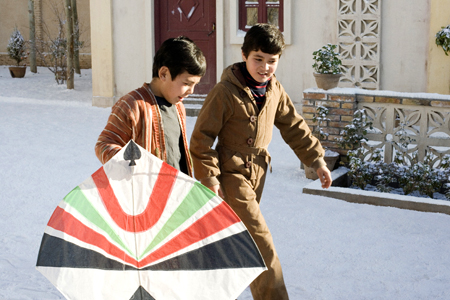|
Reviews of Recent Independent, Foreign, & Documentary Films in Theaters and DVD/Home Video
Directed by Marc Forster Produced by William Horberg & Walter F. Parkes Written by David Benioff, based on the novel by Khaled Hosseini (in Dari, with English subtitles) Director of photography, Roberto Schaefer Edited by Matt Chessé Music by Alberto Iglesias Released by Paramount Vantage Language: English, Dari, Pashtu & Urdu with English subtitles USA. 128 min. Rated PG-13 With Khalid Abdalla, Atossa Leoni, Shaun Toub, Sayed Jafar Masihullah Gharibzada, Zekiria Ebrahimi, Ahmad Khan Mahmoodzada & Homayoun Ershadi. David Benioff tightly adapts Khaled Hosseini's bestselling novel of redemption, straightforwardly following the friendship of two best friends growing up in Kabul, Afghanistan, in the late '70s: the somber Amir, son of a wealthy widower, and compliant Hassan, the servant’s son in Amir’s household. Being an ethnic Hazara, illiterate Hassan hero-worships Amir, who reads to him and tells him stories of his own creation, when they’re not taking a kite to the skies. Hassan does Amir’s bidding, including defending him from bullies (much to Amir’s father’s embarrassment). The boy’s timidity in standing up for himself, or anyone else, ultimately leads to his betrayal of his friend. Hassan, ever a steadfast servant, remains loyal to the end. Enter the Soviet invasion of December 1979, and Amir and his father flee the country after a harrowing narrow escape or two. In the film’s second half, now in 2000, they’ve settled in Northern California. The once aristocratic father now manages a gas station, and Amir, now married, has a budding career as a novelist, but a cryptic phone call from a family friend brings Amir back to Afghanistan, a land now ridden with the scars from years of war and the subsequent rise of the strict and brutal Taliban with their beard patrols and sharia laws. It's a solidly crafted film, and looks and feels very different than others that director Marc Foster has made (Monster’s Ball, Stranger than Fiction). Yet with a sentimental, though muted, ending, the film is unmistakably from the same fimmaker of Finding Neverland, though not nearly as syrupy. The computer-generated Kabul kite flying contest, in a strenuous effort to hold the audience’s interest, resembles the dog fights from Star Wars. The tournament goes on fair too long, like in the book, and really slows down the story. That said, the kite sequence is integral to the film, as it shows how this sport culturally binds the boys in the same way Little League softball does in the States. Remaining largely faithful to Hosseini’s widely-read and highly-acclaimed novel, the viewer senses the autobiographic nature of these events. What’s missing from the film is the writer’s longer, more arduously detailed account of Amir and his father’s exodus from their homeland. The violence in the film, including the notoriously problematic (for the filmmakers) and news making rape scene is very measured…implicit but not overly graphic. Clearly the filmmakers have attempted to tone down the incident.
Much of the dialog is in Dari, Pashtu, or Urdu, which gives the drama more weight, and the streets scene set in Kabul and Pakistan
are full of vitality. But overall, the film relies on the plot to propel the story forward more so than in the acting (the adult Amir is either
reserved or overacts.) However, the young actor playing Hassan, Ahmad Khan Mahmoodzada, does a memorable job, playing a boy with the gait and
temperament of someone five times his age.
David Nudo, Publisher – Publishers Weekly
|

